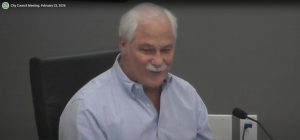Ambassador Chas Freeman, Ralph Nader examine the fragility of American diplomacy
6 min read
Curtis Blankinship (KEPW News): Charles ‘Chas’ Freeman Jr. is an American retired diplomat and writer. He served in the United States Foreign Service, the State, and Defense Departments in many different capacities over the course of 30 years. Most notably, he worked as the main interpreter for Richard Nixon during his 1972 China visit and served as the U.S. ambassador to Saudi Arabia from 1989 to 1992, where he dealt with the Gulf War.
[00:00:26] He is a past president of the Middle East Policy Council, co-chair of the U.S.-China Policy Foundation, and a lifetime director of the Atlantic Council. In February 2009, it was reported that Freeman was then Director of National Intelligence Dennis C. Blair’s choice to chair the National Intelligence Council in the Obama administration. After several weeks of criticism he withdrew his name from consideration.
[00:00:49] He spoke with Ralph Nader on a recent installment of the Ralph Nader (Radio) Hour on the lack of diplomatic adherence to the rule of law, the increase of secular governments, and what needs to be done about it.
[00:01:00] Ralph Nader: Why are the law schools not arousing themselves? Why are the bar associations not arousing themselves? Why is the resistance becoming weaker against pending autocracy and American-style fascism? There is no discernible reason other than intellectual cowardliness to explain the silence of a million practicing lawyers and all kinds of bar associations and over 200 law schools. Don’t they see what’s coming?
[00:01:34] Ambassador Chas Freeman: I don’t think they do. I think they’re focused on their careers. I think law schools, to a great extent, have become trade schools. That is to say, the questions of jurisprudence, the importance of the rule of law, these fundamentals are not really addressed nor are ethical considerations. We live in an age in which the Congress is manifestly venal and corrupt.
[00:01:58] The political campaigns we run are directed by plutocratic contributors in a manipulated democracy in which there are limited choices. The choices reflect the extremes of political opinion rather than common questions of concern to the public, although we have also a stultifying, suffocating unanimity (as you indicated) on things like the defense budget and the use of force rather than diplomacy to resolve problems.
[00:02:29] This is all terribly expensive. The Watson Institute at Brown University, with which I formerly associated (I’ve now retired from it), has an institute called the Institute for the Study of War and Costs of War. And it is, we have run up of $8 trillion liability on wars that we’ve lost. And that is not even counting Ukraine, where we probably are on the verge of losing.
[00:02:53] And so this money, which might have gone into raising educational standards, removing obstacles to efficient transport, infrastructure investment, development of the sustaining our scientific and engineering lead internationally, which we’ve lost now, didn’t go into that. It went into, was poured into the desert sands of the Middle East and Afghanistan. And we accomplished nothing. In the end, the Taliban were stronger than ever and returned to power in Afghanistan.
[00:03:23] We are seeing in West Asia, generally, in North Africa to some extent, the triumph of Islamism. The secular governments that hated at least this service to human rights doctrines and Western legal concepts have all gone. In Libya, we intervened. Gaddafi was no great champion of human rights. But he was secular. He was not imposing a religious doctrine on anybody. And yet we now have Libya in a state of anarchy contested between various religious factions.
[00:03:52] We saw in Afghanistan, as I said, the effort by both the Russians and the United States to introduce secular government concepts overtaken by the Taliban. We have seen in Israel the removal of secular government in favor of religious fanatics, religious scientists, who disdain any concept of restraint on government power or the rule of law, are defiant in relation to the entire fabric of international law which was created in no small measure to protect the world’s Jews and the state of Israel from the sort of thing that happened in World War II.
[00:04:29] We saw in Iraq, there was a secular government there. Not a good one. A terrible one. But it has been replaced by a Shiite religious-dominant tyranny. The same thing is true in Syria. Assad was secular. There were many, many religious opinions allowed. He was a terrible ruler, and the atrocities he committed were immense. But we now have a very uncertain prospect with people who were formerly beheading kids and killing families and assassinating people for their religious beliefs in power. They claim they’ve changed. We can’t be sure that that’s the case.
[00:05:08] So we’re seeing a general trend pretty much everywhere and I could add India, where Hindu obscurantism is overtaking the secular government that India had when it became independent. We see everywhere a trend way from respect for law for the civil institutions of government, the separation of mosque and state or church and state or temple and state. And this is clearly, we’re entering a very different era in which there are no legal restraints on the misbehavior of states, or for that matter, non-state acts.
[00:05:42] Ralph Nader: Well, there is a little bit of light at the end of the tunnel here. American public opinion, even though it is subjected to relentless propaganda—look at all the militarization surrounding professional sports, for example—is moving against empire. It’s turning against unconditional support for Israeli aggression and genocide. It’s beginning to turn against unaudited military budgets and waste and corruption.
[00:06:09] So the gap between public opinion, and what’s going on in Washington, the government of the corporations, by the corporations, for the corporations, and the military-industrial complex, is getting bigger and bigger, but it’s not organized sufficiently. It doesn’t have an organized voice in Congress, and there aren’t enough civic institutions being formed to focus this public opinion on the decision-making arenas, such as Congress, state legislators, the media, and therefore it’s sort of a passive rising opposition.
[00:06:44] And I must say, Chas Freeman, the way you’ve been excluded is a symptom of what’s going on here. The people who have served in the government and are now out of the government and know a great deal about empire and about law and about corporate power are marginalized by the media. You are not invited by NPR listeners. He’s not invited by PBS listeners. You can imagine that he’s not invited by the commercial corporate media. Are you doing anything, listeners, to demand that voices, knowledgeable voices, are reported in your local newspapers?
[00:07:24] They are all over the country. There are progressive veterans groups like Veterans for Peace, the retired Foreign Service people who have a lot to say to inform their neighbors and their communities, and it’s good to call up NPR and PBS and say:
“Why aren’t voices like Chas Freeman being allowed to express themselves? They have a record of accuracy, of honesty, of commitment to the true, peaceful interests of the United States. They’re willing to speak courageously to challenge empire to provide truth against power. And yet they’re excluded.”
That is a very bad sign of the march toward autocracy and fascism in the U.S. And the real risk now, I would say Chas, is Israel has so much power in the U.S. that it could create incidents which would flip the United States into a blazing barrage of empire expansion and suppression in the United States domestically.
And they have an incoming president who is ripe for that kind of manipulation to begin with. And he has basically supported the annexation of the West Bank, taking over the Golan Heights by Israel. He is more pro-Netanyahu even than Bibi Biden and Bibi Blinken.
[00:08:46] So isn’t it important to anticipate things like this so that the mere anticipation produces a public discussion that could serve as some sort of deterrent so that the Israeli machinations, for example, and other external forces think twice about stirring the pot in the United States and creating a cataclysmic situation?
[00:09:10] Curtis Blankinship (KEPW News): Meanwhile, the ruling group continues its war against its own subjects with its policy of state-sponsored corporatism. The Ralph Nader Hour can be heard on KEPW on Mondays at 9 a.m. For KEPW News, I’m Curtis Blankinship.
Ambassador Chas Freeman appeared on Ralph Nader Hour Episode 562, “American Scofflaws.”







